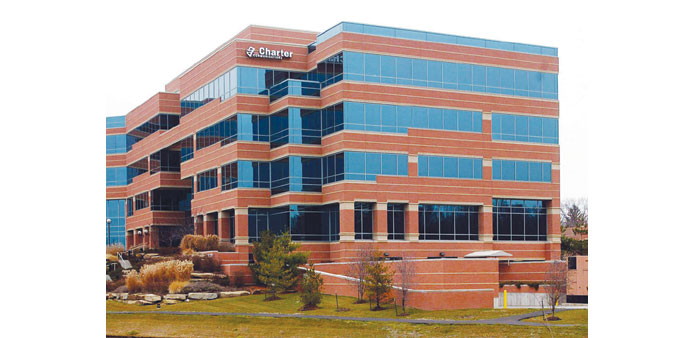A Charter Communications office is seen in Des Peres, Missouri. Leaders from Charter Communications and Altice say that it may be time to focus on digesting the targets acquired so far rather than embarking on new deals.
Bloomberg/Amsterdam
Telecommunications and media assets have become too expensive and cheaper targets are harder to come by after a flurry of takeovers in Europe and the US, according to two of the world’s most acquisitive cable companies.
Leaders from Charter Communications and Altice said on Friday it may be time to focus on digesting the targets acquired so far rather than embarking on new deals.
Still, potential increases in interest rates and the market turmoil caused by China may lead to company valuations dropping to more attractive levels, they said in a conference in Amsterdam.
“Asset valuations are high — we’re not going to pay 9, 10 or 11 times” earnings multiples, said Eric Zinterhofer, chairman of Charter. “They’ll go down eventually, the question is when, but we can’t help but notice interest rates will have to rise, China’s causing wobbles and commodity prices are affecting some markets.”
More than 360 telecommunications deals have been announced this year, according to Bloomberg data, as carriers seek to reduce costs and expand service offerings. Charter, based in Stamford, Connecticut, has agreed to buy Time Warner Cable for about $55bn. Altice has become one of Europe’s most active telecommunications acquirers since its 2014 initial public offering, snapping up companies including US cable provider Suddenlink Communications and French wireless carrier SFR.
Altice, French billionaire Patrick Drahi’s investment vehicle, is focusing on integrating SFR with its French cable carrier Numericable, while restructuring its Portuguese business.
Meanwhile, Charter is awaiting regulatory clearance for the Time Warner Cable takeover, and is “optimistic” about gaining approval, Zinterhofer said.
Down the road, rising interest rates are likely to lead to acquisition opportunities at more appealing valuations, Zinterhofer said. That may be amplified if there’s a downturn in advertising revenue that causes distress for some media companies, he said.
Further market turbulence caused by China could also lead to lower prices. Global equities lost as much as $8.4tn in value after China’s unexpected devaluation of the yuan spurred concern the world’s second-biggest economy was on the brink of a deeper slowdown. Right now, though, there are no clear acquisition opportunities, said Altice chief executive officer Dexter Goei.
“There are no obvious targets for us, not KPN, not anyone else — it all depends on price,” Goei said, referring to Royal KPN of the Netherlands. “There’s a scarcity of assets that are cheap, but if a stock is too expensive today, maybe we’ll look again in two years when China blows up or something else happens. We’re always opportunistic.”
Charter shares declined 0.8% to $180.24 at 10:43 a.m. in New York. Altice fell 0.6% to €25.25 in Amsterdam.
Altice has said it may favour issuing capital rather than raising debt to finance future acquisitions. The company is comfortable with its balance sheet, Goei said.
“We’re not in empire building mode just for empire building, and cost of capital isn’t the only factor,” Goei said. “It’s got to feel right.”

